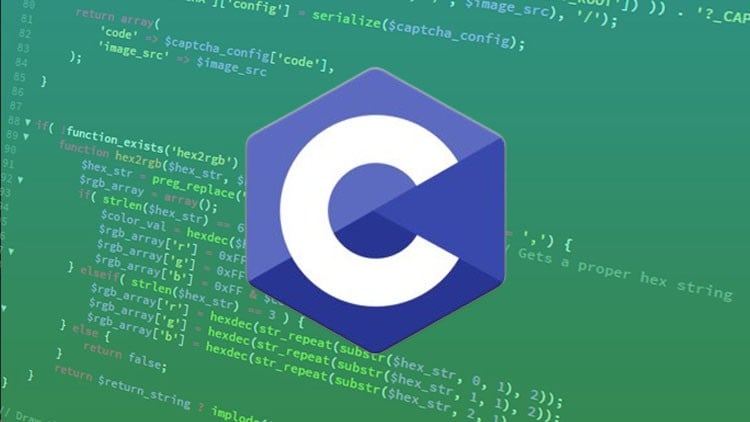
Understand The Basics To Advanced Of C, Including Its Syntax, Data Types, And The Structure Of C Programs.
⏱️ Length: 1.9 total hours
⭐ 4.13/5 rating
👥 27,298 students
🔄 January 2024 update
Add-On Information:
Note➛ Make sure your 𝐔𝐝𝐞𝐦𝐲 cart has only this course you're going to enroll it now, Remove all other courses from the 𝐔𝐝𝐞𝐦𝐲 cart before Enrolling!
-
Course Overview
- Embark on a comprehensive journey into C programming, meticulously crafted for learners ranging from absolute beginners to those aspiring for expert-level proficiency.
- This course provides a robust foundation, demystifying C’s fundamental principles before progressively delving into its more intricate and powerful capabilities.
- Navigate the complete lifecycle of C program development, gaining clarity on how C interacts directly with system hardware and memory.
- Explore advanced topics empowering you to write efficient, performant, and memory-safe code, essential for various computing domains.
- Benefit from a curriculum refined with a January 2024 update, ensuring you learn the most relevant and effective C programming practices.
- Join a thriving community of over 27,000 students who have successfully launched or enhanced their programming careers with this highly-rated course (4.13/5).
- Despite its depth, the course is structured for maximum impact in a concise timeframe, focusing on practical application and core understanding.
-
Requirements / Prerequisites
- No prior programming experience is necessary; this course assumes you are starting from scratch and builds knowledge step-by-step.
- A computer with an internet connection is all you need to access materials and set up your development environment.
- Possess a strong desire and enthusiasm to learn programming and develop a solid understanding of how software truly operates at a foundational level.
- Comfort with basic computer operation, such as navigating file systems, will be beneficial but not strictly required.
- An open mind and a willingness to engage with problem-solving challenges are key attributes for success.
-
Skills Covered / Tools Used
- Mastering Core Control Flow: Gain proficiency in utilizing conditional statements (if-else, switch) and looping constructs (for, while, do-while) to dictate logical program execution paths.
- Leveraging Pointers and Memory: Develop an expert understanding of pointers, their arithmetic, and their crucial role in direct memory access, dynamic memory allocation, and optimizing performance.
- Implementing Modular Functions: Learn to design and implement functions, including passing arguments by value and reference, to create organized, reusable, and scalable code structures.
- Performing Robust Input/Output: Become adept at reading data from various sources (e.g., keyboard, files) and writing output to different destinations (e.g., screen, files) using standard C I/O functions.
- Working with Preprocessor Directives: Understand how to use directives like `#include`, `#define`, and conditional compilation to enhance code reusability and manage builds.
- Effective Debugging Strategies: Acquire practical techniques for identifying, locating, and resolving logical errors within your code beyond compiler-reported issues.
- Utilizing Standard Library Functions: Familiarize yourself with C’s extensive standard library for string manipulation, mathematical operations, and general utility functions.
- Navigating a C Development Environment: Gain hands-on experience in setting up and working within a C Integrated Development Environment (IDE) or using a command-line compiler effectively.
-
Benefits / Outcomes
- Build Strong Foundational Logic: Develop a robust logical thinking framework, highly transferable for learning any other programming language or tackling complex computational problems.
- Understand Low-Level System Interactions: Obtain a clear understanding of how programs interact with hardware, memory, and operating systems, critical for system and embedded development.
- Create Efficient, High-Performance Applications: Acquire skills to write optimized C code, leading to applications that are functional, fast, and resource-efficient.
- Prepare for Advanced Programming: Lay an excellent groundwork for delving into more complex areas like data structures and algorithms, operating systems, and compiler design.
- Enhance Problem-Solving Capabilities: Sharpen your analytical and problem-solving skills through numerous practical exercises and real-world coding challenges.
- Boost Career Prospects: Position yourself as a proficient C programmer, opening doors to roles in software development, embedded systems, and high-performance computing.
- Confidently Read and Interpret C Codebases: Develop the ability to easily understand and modify existing C projects, making you a valuable asset in collaborative development environments.
-
PROS
- Comprehensive Curriculum: Covers C programming from basics to advanced topics for a complete learning path.
- High Student Satisfaction: A 4.13/5 rating from a large student base signifies a well-received and effective course.
- Recent Updates: The January 2024 update ensures current and relevant content, avoiding outdated practices.
- Practical Approach: Focuses on hands-on application, enabling immediate skill utilization.
- Strong Community: Benefit from being part of a large student body, fostering peer learning and support.
-
CONS
- Dedicated Time Commitment: While concise, mastering C programming demands consistent practice and effort beyond the lecture content to truly internalize concepts and achieve proficiency.
Learning Tracks: English,Development,Programming Languages
Found It Free? Share It Fast!